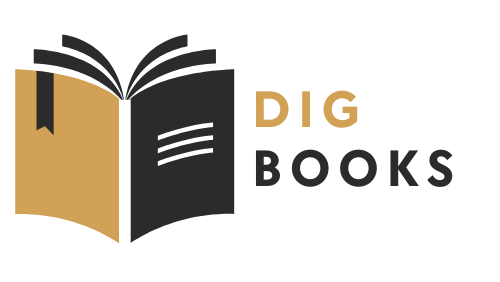13 Best Books On Psychedelics For Conscious Exploration
13 Best Books On Psychedelics For Conscious Exploration
In the vast expanse of human consciousness, there lies a realm that has been both venerated and vilified – the psychedelic experience. Throughout history, humans have sought paths to transcend the everyday, to peek behind the curtain of our perceived reality. Today, as more individuals quest for meaning beyond the material, the best books on psychedelics have emerged as beacons, guiding explorers through the mysteries of the mind and the universe.
Key Points:
- Books on psychedelics offer a multidimensional view of consciousness exploration.
- Reading about psychedelics can provide insights but not replicate the direct experience.
- Safety in exploring psychedelics through literature lies in reliable sources and realistic expectations.
- Prioritize education, caution, and consulting healthcare professionals for safe exploration of psychedelics.
- Literature on psychedelics serves as a beacon for understanding, caution, and enlightenment.
- The 13 curated books provide a bridge between curiosity and knowledge in the psychedelic realm.
From ancient rituals to modern science, psychedelics have played a fascinating role in human culture. This collection of literature represents not just a cornucopia of knowledge but also a diversity of perspectives – from the scientific to the mystical, the historical to the personal. Each author invites us on a journey to understand not just the nature of psychedelics, but their profound impact on consciousness, health, and society.
As your guide, I bring years of curatorial expertise and a deep passion for the power of books to transform minds and hearts. Whether you’re a skeptic or a seeker, a researcher or a dreamer, this journey through the best literature on psychedelics promises insights and revelations. Let’s explore together the enigmatic world of psychedelics and the boundless potential they hold for conscious exploration.
Exploring the Psychedelic Realm Through Literature
In the grand tapestry of human exploration, literature serves as a map and compass, guiding us through unfamiliar territories of mind and spirit. Books on psychedelics, with their rich blend of science, history, personal narrative, and speculative thought, offer a multidimensional view of this intriguing realm. They uncover the layers of our consciousness, connect us with ancient traditions, and illuminate the frontiers of contemporary research. Through these literary voyages, we gain a deeper appreciation for the complex interplay between psyche, culture, and the substances that offer a key to unseen worlds.
1. How to Change Your Mind: What the New Science of Psychedelics Teaches Us About Consciousness, Dying, Addiction, Depression, and Transcendence by Michael Pollan
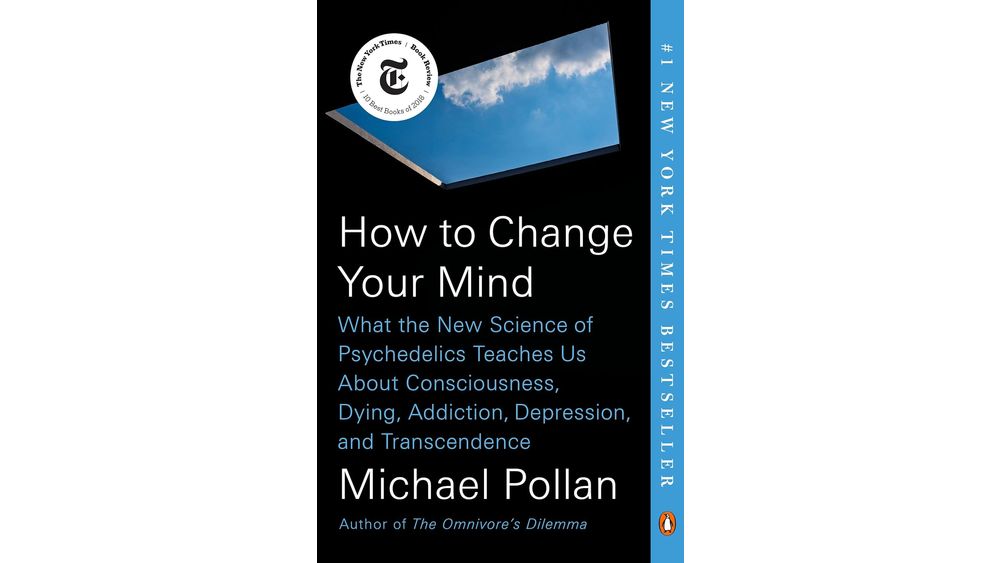
Michael Pollan’s journey into the world of psychedelics serves as a compelling primer for anyone interested in the impact of these substances on the mind, body, and soul. Drawing from historical research, personal experimentation, and cutting-edge science, Pollan deftly navigates the complex landscape of psychedelic use, its stigmatization, and its potential for healing. His skeptical yet open-minded approach makes complex topics accessible and engaging, offering a balanced perspective on the revival of psychedelic research.
Pro:
- Pollan’s writing is both accessible and thoroughly researched, making complex scientific concepts understandable to a general audience.
- Incorporates a broad spectrum of perspectives, from historical uses of psychedelics to contemporary scientific research.
- Personal anecdotes from Pollan add a relatable and humanizing element to the discussion.
Contra:
- Readers entrenched in either a wholly scientific or mystical viewpoint may find the book’s balanced approach less satisfying.
- Some sections might seem overly descriptive or tangential for readers seeking practical information on psychedelic use.
I recommend this book to you if:
- You’re curious about the science behind psychedelics and their potential to alter consciousness.
- You appreciate a balance between personal narrative and thorough research.
- You’re interested in the historical context and contemporary resurgence of psychedelic studies.
2. The Doors of Perception by Aldous Huxley
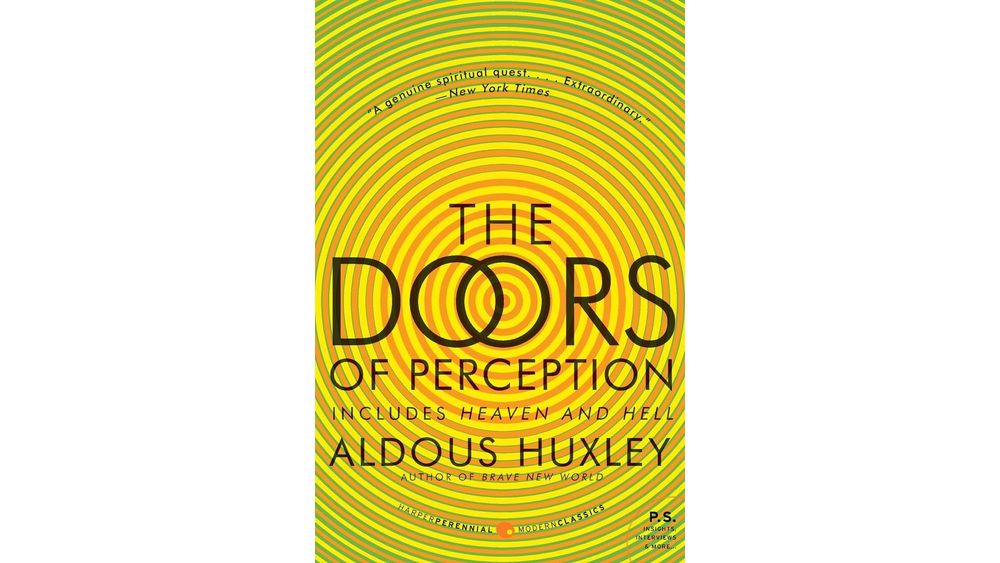
Aldous Huxley’s “The Doors of Perception” stands as a monumental classic in the psychedelic literature, beckoning readers into a world where the boundaries of consciousness are blurred and expanded. Huxley’s narrative, enriched by his own experiences with mescaline, is framed within a thought-provoking exploration of how substances can alter human perception. Reflecting on his own journey and the insights gained, Huxley takes the reader through an incisive look at the human mind, spirituality, and the search for meaning beyond the ordinary.
The title, inspired by William Blake’s assertion that cleansing the “doors of perception” would reveal the infinite to mankind, signifies the core of Huxley’s quest. It’s fascinating to note Huxley’s profound influence, not just on literary circles but also on popular culture, evidenced by its impact on Jim Morrison and, by extension, The Doors. Through its mix of personal anecdote, philosophical inquiry, and vivid descriptive passages, this book remains a pivotal “must-have” for seekers of deeper truths. [3]
Pro:
- Provides a deep philosophical and spiritual inquiry into the effects of psychedelics on consciousness.
- Offers a first-hand account of the psychedelic experience, making it relatable and immersive.
- Historically significant, influencing not only literary landscapes but also pop culture.
Contra:
- May be perceived as dated to some modern readers, given its initial publication in 1954.
- Relies heavily on personal experiences which, while insightful, might not resonate with every reader due to its subjective nature.
I recommend this book to you if:
- You are intrigued by the intersection of psychedelic exploration and profound philosophical thought.
- You have an interest in how literary figures have influenced and been influenced by the culture surrounding psychedelics.
- You’re drawn to exploring concepts of perception, reality, and the infinite beyond the conventional senses.
3. The Psychedelic Explorer’s Guide: Safe, Therapeutic, and Sacred Journeys by James Fadiman, Ph.D.

In “The Psychedelic Explorer’s Guide,” James Fadiman, Ph.D., presents an invaluable compendium for anyone keen on navigating the psychedelic terrain with respect, safety, and therapeutic intent. Drawing on a vast range of sources, from scientific research to personal accounts, Fadiman assembles a guide that demystifies the psychedelic experience, addressing its potential for self-discovery, healing, and spiritual insight. The inclusion of novel concepts, like sub-perceptual dosing, alongside practical advice, such as listening to non-vocal music during experiences, provides a holistic view of how to engage with psychedelics mindfully.
This book emerges as particularly impactful against the backdrop of the modern psychedelic renaissance, bridging a gap in literature that combines the scientific with the spiritual. Fadiman’s work shines for its comprehensive approach, offering insights into not just the psychedelic experience itself but also its integration into daily life and the potential to serve as a guide for others. Through dispelling myths and laying out a positive framework for engagement, Fadiman’s guide stands as a beacon for the psychedelic community and beyond.
Pro:
- Offers a comprehensive overview of psychedelics, covering therapeutic uses, guidance, and integration practices.
- Balances scientific research with spiritual and personal insights, making it well-rounded.
- Addresses safety and ethical considerations, reinforcing responsible use.
Contra:
- The breadth of topics covered may feel overwhelming to newcomers in the psychedelic community.
- Some readers may seek more depth in either the scientific or spiritual aspects than is provided.
I recommend this book to you if:
- You’re looking for a responsible and informative guide to psychedelic experiences.
- You wish to explore therapeutic or spiritual dimensions of psychedelics.
- You’re curious about how to assist others in their psychedelic journeys in a safe and informed manner.
4. DMT: The Spirit Molecule: A Doctor’s Revolutionary Research into the Biology of Near-Death and Mystical Experiences by Rick Strassman, M.D.
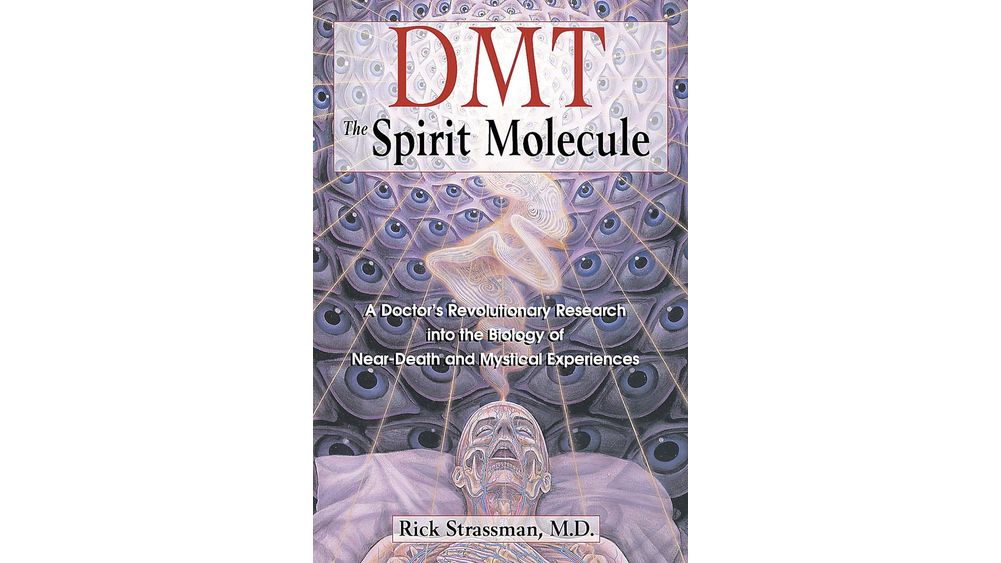
“DMT: The Spirit Molecule” by Rick Strassman, M.D., takes readers on an extraordinary journey into the research of DMT, a powerful psychedelic compound. Strassman’s groundbreaking study, which marked the first U.S. government-approved psychedelic research in decades, illuminates the profound, often mystifying effects of DMT through the experiences of study participants. The detailed accounts of “other realms” and “beings” encountered during DMT trips are both captivating and intellectually intriguing, fostering a deep dive into the psychology and biology of spiritual experiences.
Strassman’s willingness to explore the outer edges of human consciousness, balanced with his commitment to scientific rigor, makes this book a pivotal read. It lies at the intersection of science and spirituality, provoking readers to consider the reality of psychedelic experiences beyond their biochemical substrate. His candid discussion of the challenges faced in initiating and conducting this research offers invaluable insights into the scientific process, making it a touchstone for those interested in the field of psychedelic studies.
Pro:
- Pioneering research that opened doors for the resurgence of psychedelic study in modern times.
- Compelling subjective accounts that provide a vivid glimpse into the DMT experience.
- Balanced view that navigates between the scientific and the mystical without bias.
Contra:
- Detailed backstory on the research process may not captivate all readers.
- The scientific terminology and concepts could be daunting for those without a background in neuroscience or psychology.
I recommend this book to you if:
- You have an interest in the intersection of neuroscience and mysticism.
- You’re curious about the potential of DMT to provoke profound, possibly otherworldly experiences.
- You ‘re looking for a scientifically rigorous, yet open-minded exploration of one of the most powerful psychedelics known to man.
5. Food of the Gods: The Search for the Original Tree of Knowledge – A Radical History of Plants, Drugs, and Human Evolution by Terence McKenna

Terence McKenna’s Food of the Gods embarks on an audacious exploration of the relationship between humans and the psychoactive plants that have shaped our cultures and consciousness. Meticulously researched and compellingly written, McKenna proposes that the use of psychedelics not only predates modern civilization but was the catalyst for societal development and the spark for our collective imagination. With a blend of historical insights, cultural anthropology, and personal narratives, McKenna invites readers to reconsider the role of psychoactives in our past and present. [2]
The book doesn’t shy away from controversial topics, probing into the dawn of human evolution and suggesting that substances like psilocybin mushrooms might have played a crucial role in the development of language, art, and religion. McKenna’s narrative sweeps across time, from the prehistoric era to the modern “dystopia,” critiquing the dominator culture and advocating for a return to a harmonious partnership society.
Pro:
- Offers a fresh perspective on the role of psychoactive substances in human history.
- McKenna’s writing is richly detailed and accessible, making complex ideas relatable.
- Engages readers with a combination of scientific inquiry and speculative exploration.
Contra:
- Some claims might appear too speculative for readers preferring rigorous scientific evidence.
- McKenna’s critique of modern society may not resonate with everyone.
I recommend this book to you if:
- You are interested in alternate histories and the evolution of human consciousness.
- You enjoy interdisciplinary approaches combining anthropology, history, and psychedelia.
- You’re open to challenging conventional narratives about drugs and society.
6. The Psychedelic Experience: A Manual Based on the Tibetan Book of the Dead by Timothy Leary, Richard Alpert, and Ralph Metzner
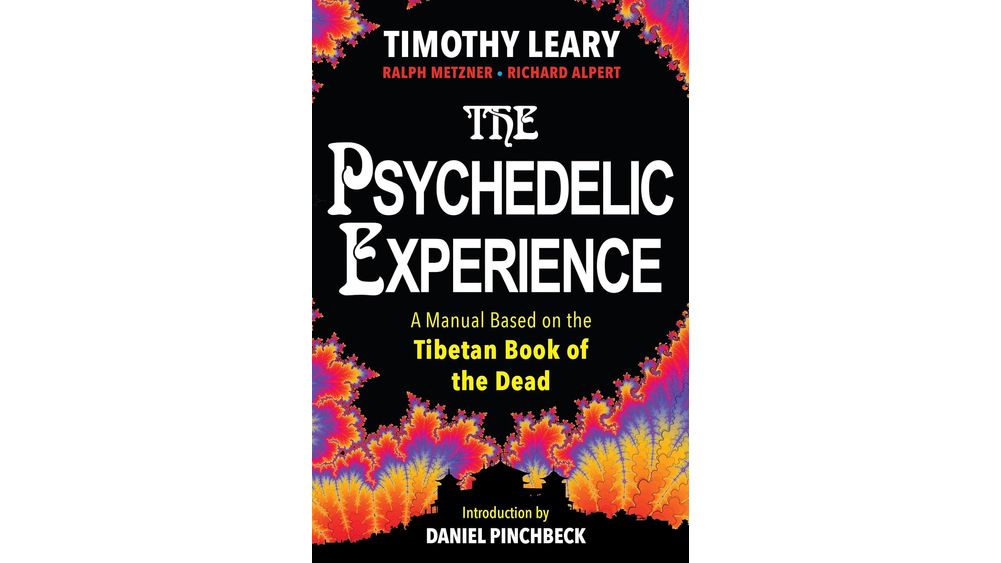
“The Psychedelic Experience” provides a unique window into the transformative potential of psychedelics, framed through the lens of the Tibetan Book of the Dead. Written by pioneering figures Timothy Leary, Richard Alpert (Ram Dass), and Ralph Metzner, this manual is not just a book but a practical guide for navigating psychedelic journeys. With a clear focus on set and setting, the authors draw parallels between Tibetan teachings and the psychedelic experience, offering a structured pathway for exploration and self-discovery.
Despite the mixed feelings about the introduction by Daniel Pinchbeck, the core content of “The Psychedelic Experience” remains unaffected and potent. Personal anecdotes and detailed guidance make this manual a treasured resource for those seeking to understand or facilitate psychedelic sessions. Its influence is evident in personal stories of revelation and transcendence, echoing the deep impact psychedelic experiences can have, especially when approached with intention and respect.
Pro:
- Provides comprehensive guidance on navigating psychedelic states.
- Draws fascinating parallels between Eastern mysticism and psychedelic exploration.
- Offers eye-opening personal anecdotes that illuminate the text.
Contra:
- The introduction may distract or confuse some readers.
- May rely too heavily on Eastern philosophical concepts for some Western readers.
I recommend this book to you if:
- You are seeking structured guidance for your psychedelic experiences.
- You have an interest in Eastern mysticism and its parallels with psychedelia.
- You’re looking for personal stories and insights into the transformative potential of psychedelics.
8. Psilocybin Mushrooms of the World: An Identification Guide by Paul Stamets
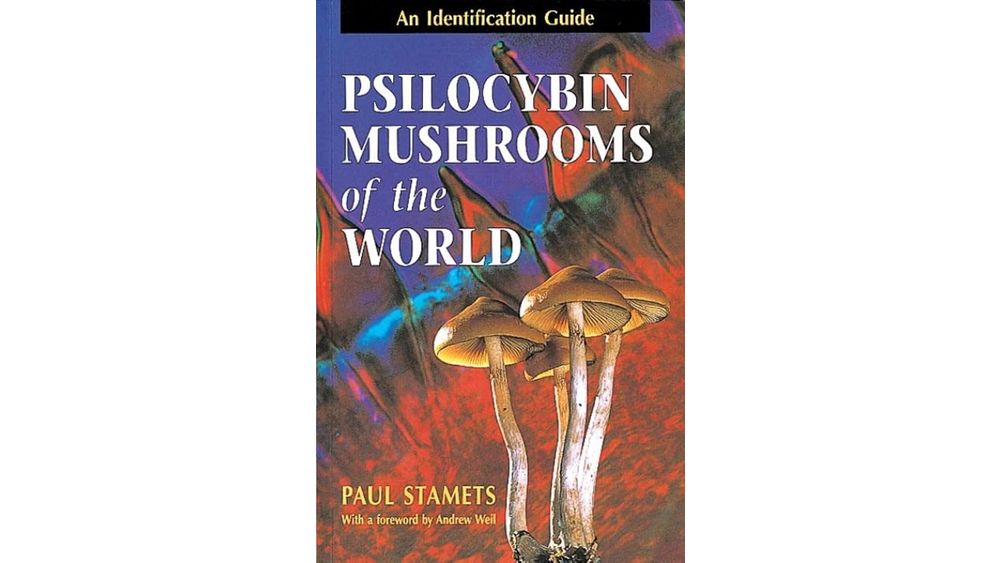
Paul Stamets, a revered figure in mycology, unveils the enchanting realm of psilocybin mushrooms in his seminal work, “Psilocybin Mushrooms of the World: An Identification Guide.” This book is a treasure trove of knowledge, offering a brief history of psilocybin, meticulous safety guidelines, and unparalleled identification knowledge. Stamets introduces readers to his namesake ‘Stametian‘ method, which enables a reliable and narrow down process for accurately identifying various species.
Pro:
- The book is a comprehensive guide for beginners in mycology, as well as those with a keen interest in distinguishing these remarkable fungi from their potentially lethal lookalikes.
- Stamets’ ‘Major Psilocybin Genera’ chapter and beyond are densely packed with facts, detailed features, accompanied by vivid images, making it an essential resource for both enthusiasts and researchers.
- For those eager to delve deeper, Stamets provides a plethora of additional resources, mycologists, and book recommendations to explore further.
Contra:
- Some readers may find the dense, fact-packed pages daunting or overwhelming at first glance.
- Despite its utility in the field, the book’s lack of a field guide version can result in wear and tear if frequently used outdoors.
I recommend this book to you if:
- You are a beginner in mycology looking for a foundational guide.
- You have an interest in the safety and identification of psilocybin mushrooms.
- You’re seeking a deep dive into the world of fungi with an expert like Stamets guiding your journey.
9. The Immortality Key: The Secret History of the Religion with No Name by Brian Muraresku
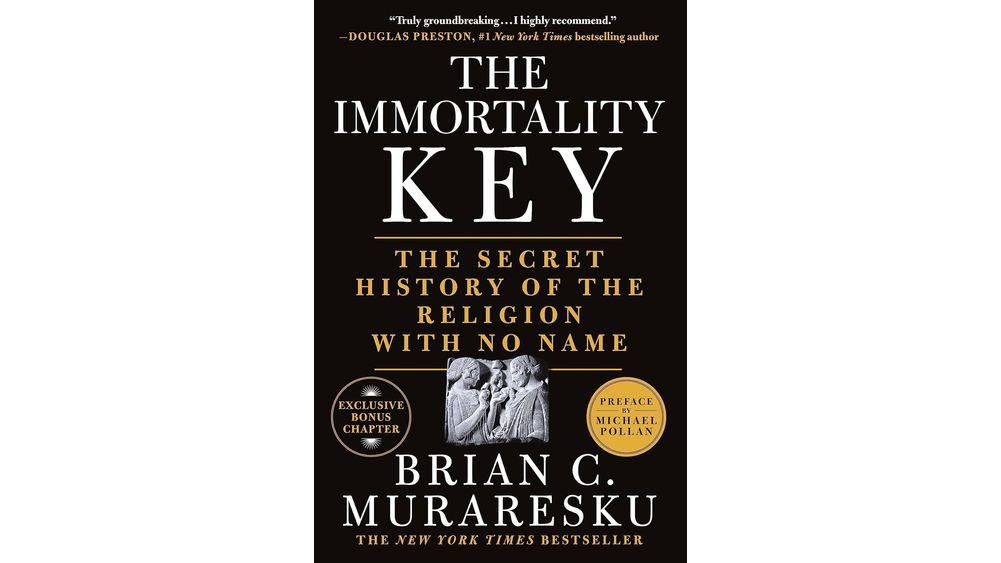
Brian Muraresku’s “The Immortality Key” delves into an ancient mystery that spans the crossroads of psychedelics and religious experiences. This book opens with a gripping discovery in a cave in Egypt, leading us on a journey that uncovers a possible psychedelic underpinning of ancient and early Christian rites. Through methodical research and engaging narrative, Muraresku connects the dots between psychedelic practices in ancient secret religions and their potential influence on early Christian ceremonies.
Pro:
- Muraresku meticulously investigates ancient texts and archaeological findings, presenting a compelling case for the use of psychedelics in religious rites from ancient Greece to early Christianity.
- The narrative is incredibly engaging, seamlessly blending historical facts with intriguing theories, making it a thrilling read for history buffs and enthusiasts of religious studies.
- Offers an eye-opening perspective on the role of women in early religious practices, shedding light on how psychedelics might have played a part in spiritual experiences and transformative visions.
Contra:
- Some readers might find the book’s hypotheses speculative, as definitive proof of psychedelics’ direct influence on major religions remains a complex and controversial topic.
- The dense historical and archaeological information might overwhelm those looking for a light read.
I recommend this book to you if:
- You are fascinated by the intersection of psychedelics and spirituality.
- You enjoy historical mysteries with in-depth research and a compelling narrative.
- You have an interest in the origins of Christian practices and their potential links to ancient psychedelic use.
10. Psychedelic Medicine: The Healing Powers of LSD, MDMA, Psilocybin, and Ayahuasca by Dr. Richard Louis Miller

“Psychedelic Medicine” by Dr. Richard Louis Miller plunges deep into the hearts and minds of leading scientists and doctors who have paved the way in researching psychedelics for therapeutic uses. The book unveils the promising potential of psilocybin, LSD, MDMA, and ayahuasca in treating a variety of conditions with remarkable efficacy and minimal side effects. It delivers an eye-opening chapter on the stark realities of conventional antidepressants and antipsychotics, shedding light on their ability to strip patients of their emotions while burdening them with numerous side effects.
The narrative further explores the tumultuous journey of MDMA from a promising legal treatment to its Schedule I classification in 1985, and the reinvigorated research that might open doors to its legality once again. While the interview format presents minor distractions, it effectively introduces readers to the vital voices in psychedelic research, making it an essential read for those keen on understanding this evolving field.
Pro:
- Offers in-depth insights into the promising benefits of certain psychedelics for therapy.
- Highlights the contrasts between traditional psychiatric medications and psychedelic treatments.
- Provides a gateway to understanding the major players in psychedelic research.
Contra:
- The interview format may be distracting for some readers.
- Focuses more on the scientific and therapeutic aspects, which might not cater to those looking for personal experiences or narratives.
I recommend this book to you if:
- You are intrigued by the scientific research behind psychedelics.
- You seek to understand the historical context and future possibilities of psychedelic therapy.
- You are concerned about the effects of traditional psychiatric medications.
11. The Joyous Cosmology: Adventures in the Chemistry of Consciousness by Alan Watts

In “The Joyous Cosmology,” Alan Watts takes readers on a profound journey exploring the depths of consciousness through the lens of psychedelics. Through his vivid narration, Watts depicts a spiritual reality rich with intense awareness, far from the desolation and isolation typically encountered in mundane existence. This book not only narrates experiences but challenges readers to ponder the nature of reality, consciousness, and our place within it.
Watts’ narrative contrasts sharply with the personal spiritual reality of some readers, inviting a reflection on the subjective nature of psychedelic experiences. The book elevates the discourse on psychedelics from mere chemical interactions to profound spiritual awakenings, where communion with others and a deep appreciation of the physical world become accessible. However, it also acknowledges the variability of experiences with entheogens, underlining that they unlock personal truths rather than delivering universal answers.
Pro:
- Alan Watts’ engaging writing style brings complex concepts to life.
- Encourages introspective thought on one’s own consciousness and spiritual experiences.
- Acknowledges the subjective nature of psychedelic experiences, fostering a broad-minded view.
Contra:
- The philosophical depth may be challenging for those seeking straightforward narratives on psychedelic use.
- Watts’ experiences and conclusions might contrast significantly with the reader’s, possibly leading to a disconnect.
I recommend this book to you if:
- You are a fan of Alan Watts and appreciate his philosophical approach to spirituality and consciousness.
- You’re curious about the interplay between psychedelics and spiritual awakening.
- You seek introspective insights rather than practical guides on psychedelic use.
12. A Really Good Day: How Microdosing Made a Mega Difference in My Mood, My Marriage, and My Life by Ayelet Waldman
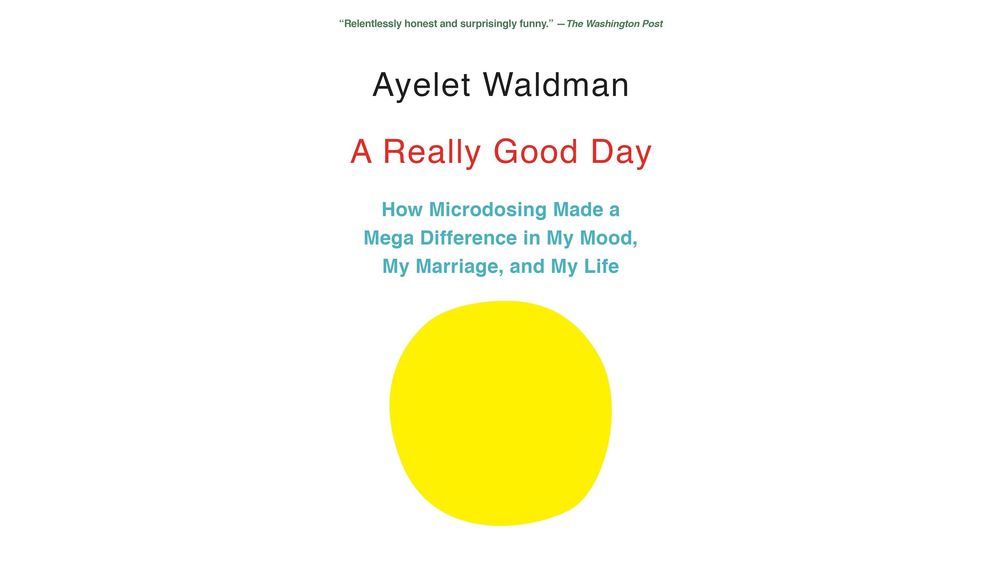
In “A Really Good Day”, Ayelet Waldman embarks on a bold and introspective journey through the realm of microdosing LSD in an attempt to alleviate her manic depression. Waldman, a former federal public defender with an instructional background on the war on drugs, brings a unique perspective to the controversial topic of psychedelics as therapy. Her narrative weaves personal anecdotes with scientific research, offering a candid look at her 30-day experiment with microdosing, its effects on her mood, productivity, and its implications within the legal and social context.
While the book shines a spotlight on the potentially transformative power of microdosing, Waldman ensures to ground her story with discussions on other treatments she has tried and a deep dive into the history of psychedelic drugs. She skillfully balances personal revelations about her marriage, family life, and relationship with her father, with a broad overview of LSD’s impact on her daily functioning. It’s an engaging blend of memoir and investigative journalism.
Pro:
- Provides an insightful and personal account of microdosing LSD.
- Offers an extensive exploration of the history and science behind psychedelics.
- Balances personal narrative with thorough research.
Contra:
- May leave readers wanting more personal storytelling and less focus on the drug itself.
- The subject matter may not appeal to those uninterested in drug use or mental health topics.
I recommend this book to you if:
- You’re interested in personal experiences with microdosing.
- You appreciate books that combine memoir with scientific exploration.
- You’re curious about alternative treatments for mood disorders.
13. Consciousness Medicine: Indigenous Wisdom, Entheogens, and Expanded States of Consciousness for Healing and Growth by Françoise Bourzat with Kristina Hunter
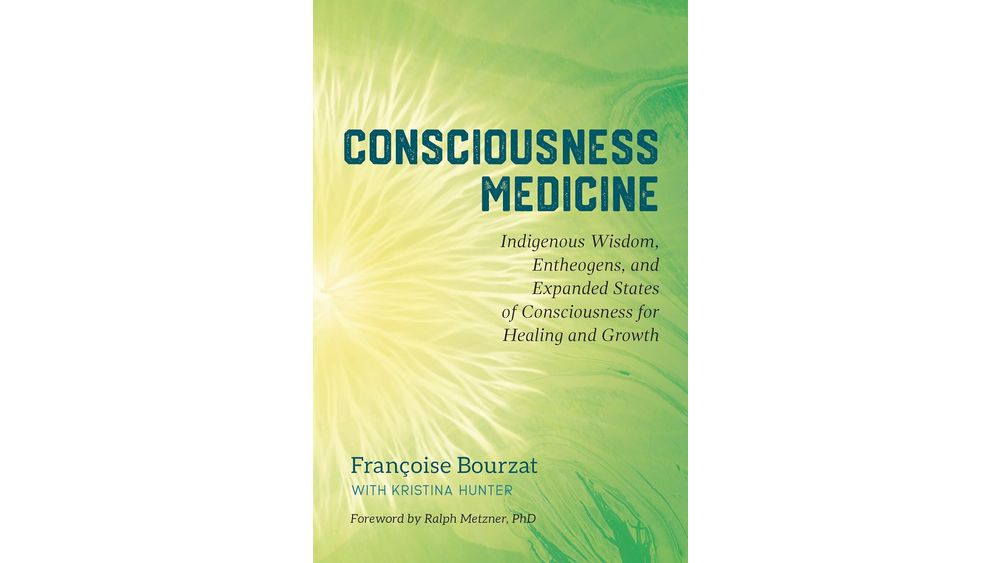
“Consciousness Medicine” by Françoise Bourzat and Kristina Hunter is a groundbreaking exploration into the healing potentials of psychedelics, merged with indigenous wisdom and practices. Bourzat, with years of experience and a poetic touch, offers practical models for those aiming to embark on a journey involving entheogens. The book excels not only in discussing preparation and integration of these experiences but also in presenting a holistic model for understanding psychological imbalances through a meticulous intake questionnaire.
The richness of this text lies in its ability to serve as a comprehensive academic resource for both journeyers and guides. It meticulously guides readers through different ceremony types, experiences, and how to support healing journeys effectively. “Consciousness Medicine” transitions from setting a foundational base to integrating psychedelic experiences into meaningful life changes, advocating for a profound engagement with trauma and psychological healing beyond the conventional methods prevalent in western psychology.
Pro:
- In-depth chapters on preparation and integration of psychedelic experiences.
- Incorporates indigenous wisdom with modern psychotherapy approaches.
- Acts as an extensive guide for both practitioners and those exploring personal healing.
Contra:
- Can be dense and academic for casual readers.
- Less narrative-driven than other books on psychedelics, focusing more on methodology.
I recommend this book to you if:
- You’re seeking a detailed guide on the therapeutic use of psychedelics.
- You prefer reading books that combine practical models with spiritual and indigenous insights.
- You’re a professional in the field of psychology or psychedelic therapy looking for a comprehensive resource.
FAQs
1. Why are books on psychedelics gaining popularity?
Books on psychedelics are gaining popularity as individuals seek alternative approaches to wellness and a deeper understanding of consciousness. This surge in interest is influenced by both scientific research highlighting potential therapeutic benefits and cultural shifts toward exploring non-traditional paths of self-discovery and mental health.
Furthermore, these books offer a safe and accessible way for individuals to explore the psychedelic realm, providing insights and knowledge that empower readers to make informed decisions about their journey into consciousness exploration.
2. Can reading about psychedelics provide a similar experience to using them?
Reading about psychedelics does not replicate the direct experience of using them, but it can broaden understanding and stimulate imagination. [1] [4]
- Books on psychedelics offer in-depth insights into their history, therapeutic potential, and impact on consciousness, which can illuminate the subject from various angles.
- However, the experiential aspect of psychedelics – such as the visual and emotional alterations – cannot be fully conveyed through text. [5]
3. Are there any risks associated with exploring psychedelics through literature?
Exploring psychedelics through literature is largely safe, but it may lead to misunderstandings or unrealistic expectations if sources are not reliable.
- Selecting books that are well-researched and written by reputable authors minimizes the risk of misinformation.
- It’s also crucial to remember that reading about psychedelics cannot substitute for proper mental health care or guided therapeutic sessions if looking to address specific issues.
4. How can I safely explore the world of psychedelics?
To safely explore the world of psychedelics, it’s essential to prioritize education and caution. Start by immersing yourself in literature on the subject to understand both the potential benefits and risks. Make sure to consult with healthcare professionals, especially if you have underlying health conditions or are using other medications. Additionally, considering the legal status of psychedelics in your jurisdiction is crucial. Engage with communities or groups that center on harm reduction and safe practices to gather firsthand experiences and advice. [6]
Conclusion
In our journey through the lively and intricate world of psychedelics, literature stands as a beacon, illuminating the paths of understanding, caution, and enlightenment. These 13 books, meticulously curated, offer a comprehensive view ranging from scientific explorations to personal anecdotes, ensuring a well-rounded exploration into the psychedelic realm. They represent not just a list but a bridge between curiosity and knowledge, each entry a door to profound insights and transformative experiences.
Our exploration through the best books on psychedelics emphasizes the importance of approaching this realm with an open mind yet armed with critical thinking and awareness about psychological and legal safety. These books serve as guides in the vast territory of consciousness exploration, helping us navigate its profound depths with respect, care, and a sense of wonder.
I hope this compilation sparks joy, curiosity, and a deeper understanding of the psychedelic experience. May your reading journey be as enlightening as it is pleasurable. Until next time, happy reading and exploring!
Emma
